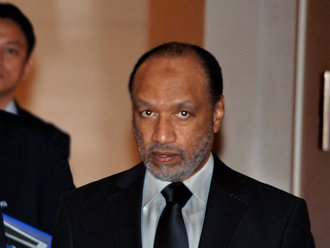By Andrew Warshaw
January 15 – Disgraced former Asian football leader Mohamed Bin Hammam has broken his long silence by confirming he received €6.7 million in a payment that is long suspected to have been linked to the awarding of the 2006 World Cup to Germany.
However, the former FIFA vice-president has denied involvement in any bribery, according to a report broadcast Sunday by Germany’s ZDF channel, since the money was paid well after the vote in 2000.
Bin Hammam was twice banned from football, the first time over vote-buying allegations surrounding the 2011 FIFA presidential election and then, after that was overturned, for misuse of Asian Football Confederation funds.
In the exclusive ZDF interview, he said: “The €6.7 million have gone into my account, yes. But I would like to know why Germany should have bribed me for something they have already received. The sum was received after the World Cup award.”
Asked if he knew why he received a payment from Germany, the Qatari replied: “I do not know. No, of course I know, but excuse me – it’s only you who cares, no one else.”
The fact that he did not go any further is interesting in itself and will doubtless cast fresh suspicion over whether Germany’s campaign was clean. Allegations have long persisted that the same amount of money was used for a secret slush fund to buy votes. The same figure of €6.7 million was reportedly sent by the German Football Federation to FIFA, declared as a contribution for a cultural gala which never took place. Investigators believe this was a hidden repayment via FIFA to repay former Adidas chief Louis-Dreyfus who had allegedly loaned the money.
A Swiss criminal investigation into corruption allegations over the awarding of the 2006 tournament is still ongoing and last spring former bid chief Franz Beckenbauer, Germany’s most revered footballing icon, was questioned by Swiss prosecutors.
Also subject to the Swiss criminal investigation were former DFB presidents Theo Zwanziger and Wolfgang Niersbach as well as ex-DFB general secretary Horst R Schmidt. Back in 2016 Niersbach, once touted as a possible Uefa president, was hit with a one-year ban for failing to report possible misconduct and conflicts of interest during the bidding process when Germany edged South Africa by a single vote to win 12-11 for the right to stage the tournament.
Niersbach was one of six prominent German officials, including Beckenbauer, probed in the wake of an internal inquiry commissioned by the German FA and carried out by law firm Freshfields into the bid. No evidence of vote-buying was found by Freshfields, but neither was it ruled out. The alleged slush fund has never been proven but World Cup organisers have been under scrutiny ever since Frehsfields’ 360-page report commissioned by the DFB attempted to explain a trail of suspect payments.
Swiss prosecutors and German tax authorities specifically want to know how and why the €6.7 million payment ended up being transferred to a company controlled by Bin Hammam.
In the ZDF programme, he admitted: “All the people have been (at) FIFA for so long and thought FIFA was theirs, they can do what they want, what’s good for them personally – including me. I do not mean to say that I was an exception: people who have the greatest power always think they can do what they want.”
He also insisted he was not concerned about ongoing suspicions surrounding Qatar’s 2022 World Cup bid. “They do not affect me all. These are just allegations and remain allegations.”
Contact the writer of this story at moc.l1745329077labto1745329077ofdlr1745329077owedi1745329077sni@w1745329077ahsra1745329077w.wer1745329077dna1745329077

